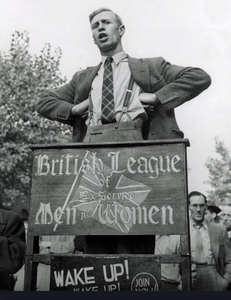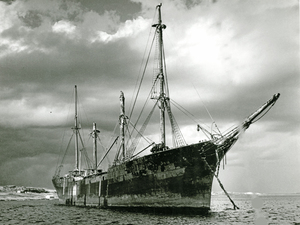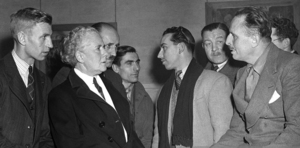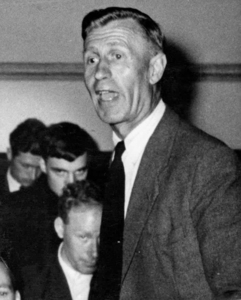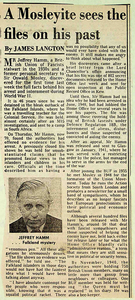HAMM, EDWARD JEFFREY
1915 - 1992 from Wales
travelling teacher and political activist. Edward Jeffery Hamm was born in Ebbw Vale, Wales on 15 September 1915 to a farming family. He was educated at West Monmouth School, and he became a teacher at a private school.
In 1934 he attended a Blackshirt rally at Kilburn, in London and he embraced fascism, visiting Nazi Germany in 1937. Hamm eventually became one of the leading British fascists and he was an ardent supporter of Sir Oswald Mosley. Before World War II, Hamm was only a minor player in Mosley’s movement, but after the War he became the leading figure in the fascist movement in Britain - eventually succeeding Mosley, as leader of the UK fascists, when Mosely retired from public life.
In August 1939 he was offered a three year ‘temporary engagement in the Colonial Service’ to work as a Travelling teacher in the Falklands and on 8 January 1940 he joined RMS Highland Monarch for the journey south. Two weeks later the ship arrived at Montevideo where the RMS Lafonia was waiting to take him on the final part of the journey to Stanley.
On arrival in the Falkland Islands Hamm immediately began work as a Camp teacher.
I settled down to the slow routine of Falkland life, with its menu of mutton, provided in every conceivable form four meals a day, seven days a week, and its evenings enlivened only by conversation restricted to sheep and the weather, varied with much card playing and drinking of gin and whisky.
But within a few months, Hamm was arrested at San Carlos on a charge of allegedly spreading fascist views among the children he taught - something which Hamm always strenuously denied.amm
So, I continued my work until 3 June. On that day my breakfast in an isolated cottage was interrupted by the arrival of three [sic] members of the Falkland Islands Defence Force … they were armed with revolvers and had brought handcuffs with them. They asked me if ‘I would come quietly’.
Hamm was arrested on 3 June 1940 at the Head of the Bay settlement at San Carlos by two members of the FIDF, who had been sent out from Stanley complete with handcuffs, revolvers and restraints – all of which were subsequently unused. One member of the San Carlos settlement when they saw what was happening is reported as saying “poor Mr Hamm”. This small act of kindness reduced Hamm to tears. The arresting officers questioned Jack BONNER, owner and manager of San Carlos farm, about Hamm’s activities, and Bonner said that he had been warned not to engage in any political activity and that he had complied fully.
During the three-day journey by horseback into Stanley Hamm recounts:
Over the last mile we had a race, they had better horses than me and the situation was reduced to a farce as the prisoner urged on his horse in an attempt to catch up with his gaolers … As the pace grew faster, my horse stumbled in a pothole … I was thrown from the saddle, and a metal stirrup hit me in the face, breaking my nose. I arrived in Port Stanley with my face smeared in blood, as if to confirm the rumour sweeping the island that I had violently resisted arrest.
Despite his outspoken views on social issues, his former pupils recollect that Hamm was a pleasant and effective teacher. A former pupil recalled that: “Jeffrey Hamm was a friend of my parents, and they thought a lot of him … he had blond hair, was very good looking and friendly.” The Governor (Herbert HENNIKER HEATON) had received a secret despatch from the Colonial Office, dated 15 April 1940, warning him of Hamm’s alleged subversive activities, and advising him to arrange for a watch to be kept on Hamm’s activities. An order by the Governor to detain Hamm was issued on 29 May 1940.
Hamm was subsequently held for some months, in what he regarded as fairly poor conditions in the hulk Fennia in Stanley harbour, before being sent to an internment camp in South Africa.
In my dismal dungeon in Port Stanley, I found I had a companion … His name was Andreas Sollner, and he was a German born in Eger, in Sudetenland … There were no rules. We got up when we liked and went to bed when we liked. We ate whenever we could summon up enough enthusiasm to cook some of our meagre and unappetising rations, which were brought out to us from the shore once a week. We were allowed on deck by day, but frequent rain and high winds soon drove us below again. Once a week we were taken ashore to the public baths, marched there and back by armed guards … From my floating prison I bombarded the Governor of the Falklands with letters claiming my right, as someone detained in a Crown Colony, to appeal to London.
On his arrival in Stanley Hamm wrote a long and very courteous letter to the Governor appealing against his detention and protesting his innocence of any offence that would warrant his detention:
I would humbly beg your Excellency to believe that I have endeavoured to carry out my duties faithfully and conscientiously and to the best of my ability. I have never committed any illegal act or done anything to prejudice the interests of His Majesty’s government. I have already stated that my political activities in England had no effect … I would not have come to the Falkland Islands if I were anxious to continue such activities … My decision to apply for the post of Travelling Teacher in the Falkland Islands rested upon my anxiety to secure a more remunerative post than the one held in England, in order to save sufficient money to marry … It is my dearest wish that I might be allowed to resume my duties as a travelling teacher. I have become keenly interested in my work and enjoyed the features of ‘camp life’ … I humbly ask your Excellency to accept my services … and allow me to demonstrate my integrity and anxiety to serve the government.
But there was very little sympathy for Hamm amongst the authorities in Stanley, and an Advisory Committee consisting of the Colonial Secretary, the Officer in Charge of the FIDF and the Naval Officer in command of the naval party, rejected Hamm’s appeal against detention. Hamm wrote several times to the Colonial Secretary (Allan CARDINALL – who succeeded Henniker Heaton as Governor in 1941), but to no avail. Hamm regarded the Colonial Secretary as being particularly prejudiced against him. In a letter to the Governor on 3 September 1940 Hamm described the Colonial Secretary’s attitude as ‘misplaced sarcasm’. It is clear from the records in the JCNA that Allan Cardinall was particularly unsympathetic to Hamm, and that he regarded Hamm’s constant complaining as totally unjustified.
On 26 October 1940 the Governor ordered that Jeffery Hamm be placed onboard the Lafonia and that he be deported to South Africa.
We were not told our destination, and when the time came to sail we still did not know … We made a detour through seas strewn with icebergs … we visited South Georgia, with its two whaling stations … Andreas and I disembarked at Simonstown and were taken to a detention centre at Weinberg … and then by train to Johannesburg … then to Leeuwkop internment camp, on the open veldt some ten miles from the city.
On his arrival in South Africa, Hamm continued to protest his innocence and to try and take legal action on the basis that he was arrested without just cause. The Governor’s order to deport Hamm to South Africa was possibly illegal, and the Colonial Office informed the Governor on 14 January 1941 that:
The transfer [to South Africa] was effected without legal authority and the persons concerned in it have rendered themselves liable to the penalties of [the] Habeas Corpus Act and claims for damages for wrongful imprisonment. In his reply to the Colonial Office the Governor repeated the (unsubstantiated) claim that Hamm’s activities ‘consisted in using his position as a travelling schoolmaster to inculcate fascist doctrines into farm workers and children’. It is likely that Hamm’s perceived guilt was based on either hearsay or gossip or on his membership of the British Union of Fascists in England i.e., guilt by association.
By May 1941 the Home Office had concluded that there was no justification for Hamm’s detention and that there was no need to raise any difficulty about his return to the UK, but there were to be various restrictions placed on his movements and residences. Hamm arrived back in the United Kingdom on 15 June 1941.
Hamm was totally opposed to World War II, but he was also fiercely loyal to his country, which he regarded as being in grave danger of invasion. He stated that he wished to enlist because he strongly believed in the dictum ‘my country, right or wrong’, and thus he registered for military service, and he was subsequently called up on 7 August 1941- serving in the Royal Armoured Corps. During his time serving in the Army, the Special Branch of the Metropolitan Police kept Hamm under surveillance, and his commanding officers were required to complete ‘Special Observation’ reports on a regular basis.’ All these reports indicate that there was nothing suspicious about Hamm or his activities. Hamm’s army reports state that he was ‘not given to complaining (’grousing’) neither was he a barrack room lawyer. He seems outwardly keen and steady’. However, opinions about his time in the army are varied. Some of his commanding officers did not like him at all and they found him subversive of authority. Other senior officers thought him to be an excellent soldier - one commanding officer's comment was: "Hamm is an excellent trooper, I wish I had a few more like him."
Special Branch continued to keep Hamm under observation, and all his mail was intercepted throughout 1942-1944, by MI5.
On the 2 June 1944 the decision was taken to discharge Hamm from the Army – services no longer required. Hamm was not given any reason for this decision. Hamm was very embittered about his discharge from the Army, and he strongly objected to his continuing surveillance by Special Branch After his service in the Royal Armoured Corps, he re-entered street politics and became a very effective orator in the anti-Semitic and racist campaigns of the British Union Movement. A MI5 report on Hamm dated 3 June 1946 scathingly described him as ‘a rather noisy nonentity.’ With other ex-BUF members, Hamm formed the British League of Ex-Servicemen and Women which, in addition to campaigning for the welfare of former members of the armed services, also sought to support Oswald Mosley.
In 1949, Jeffrey Hamm became the local Union Movement officer for Manchester. He subsequently returned to London and helped Mosley campaign in the 1959 North Kensington by-election. Hamm was totally devoted to Mosley, and he assisted Mosley with the production of his memoirs - published in 1968 under the title 'My Life'. Hamm stood unsuccessfully as the Union Movement candidate for parliament for Handsworth, Birmingham constituency, in the 1966 General Election.
Jeffery Hamm converted to Roman Catholicism in March 1943. He first married Sadie Kelly, by whom he had two children. After a divorce he was subsequently married to Lilian Clements. Hamm published his autobiography, entitled Action Replay in 1983.
Jeffery Hamm's papers are lodged at the University of Birmingham's Cadbury Research Library. There are seven MI5 files concerning Hamm lodged in the National Archives at Kew.
In a BBC interview in 1976 Hamm was asked if he had wasted his time in politics. He replied:
Friends often say that to me but what are they really asking me to do? To give up what I believe in because it is difficult and to take up something, I know to be wrong because it is easier. That seems to be so absurd that I must reject it out of hand.
In an interview with the journalist and historian Andrew Whitehead in1989 Hamm said:
I have no illusions, I don’t feel disappointed, I don’t think I am saving he world … I might be a voice crying in the wilderness, but that is better than sitting back and doing nothing.
Hamm was a complex character, and he defies easy analysis and assessment. He was a man of strong opinions and deeply held convictions. He was committed to social justice and workers’ rights. He had considerable oratorical skills, but his language could be intemperate and inflammatory. Hamm’s fascist views should be considered unacceptable, but many people in his day shared his political standpoint. He was a man of action, and however misguided his convictions may have been, his activities and opinions certainly brought him much personal opprobrium and vilification.
There is no doubt that Hamm remained deeply angry about his arrest and internment in the Falklands in1940: To the very end of his life Hamm was unapologetic in his views and in his devotion to Oswald Mosley. He often quoted with enthusiasm the advice of David Lloyd George once given to Mosley on the occasion of their first meeting – “Never apologise, say it again, and be ruder the second time!”
In his later years Jeffery Hamm suffered from Parkinson’s disease, and he died on 4 May 1992. Despite his violent views, his former pupils remember him as a pleasant teacher.
External links
See: Jeffrey Hamm interview in 1989 about his political activity (YouTube audio recording)
See: The papers of Jeffrey Hamm at Birmingham University library
See: MI5 and Jeffrey Hamm
See: For the complete text of the FI Government file on Jeffery Hamm
References
Jeffrey Hamm; Action Replay - an autobiography; Black House Publishing; 1983
Jeffrey Hamm; The evil good men do; Steven Books; 1992
David Boothby; The History of British Political Parties. London, U.K.; 2001
'A Mosleyite sees files on his past' Sunday Telegraph; 14 February 1986
'The activities of Jeffery Hamm, Travelling teacher, in the Falklands'; Jane Cameron National Archives; file no: WAR/W21/1#4
Stephen Palmer; Detained and deported Camp teacher in 1940; Falkland Islands Journal 2022; pp.89-102
Comments
Jeff Walder
2020-07-01 12:10:18 UTC
Jeffrey Hamm was my friend. He was not detained in WW2 for spreading fascism among Falklands children. The files at the National Archives make it clear that he was falsely denounced by another fascist woman who was staying at the same boarding house in London as Jeffrey. She was scared that she was going to be detained under Regulation 18b and sought to ingratiate herself with the authorities by making false accusations against Jeffrey. Vernon Kell, the head of MI5, ordered his detention for this reason and it was found he had moved to the Falklands. So the order for his arrest was transmitted to the Falklands, it had nothing to do with spreading fascism among children. On his release Jeffrey served with distinction in the Royal Tank Corp, his commanding officer's comment on him was "Hamm is an excellent trooper, I wish I had a few more like him."
I found Jeffrey to be a gentleman of the old school who did not judge people by their race or religion. I never heard him make an antisemitic or anti-black remark. Indeed there were Black friends at his funeral. Throughout his life Jeffrey was motivated only by the desire to halt the decline of the country that he loved and was prepared to defend his right to free speech with his fists against those who sought to silence him with violence.
Revisions
November 2019 One photograph added; three references add; three external links added
January 2020 One additional photograph added; two additional references added; an editorial comment added; one additional external link added
September 2020 Additional text added; one additional photograph added
October 2021 Main text revised; two additional photographs added
October 2022 One additional refence added
